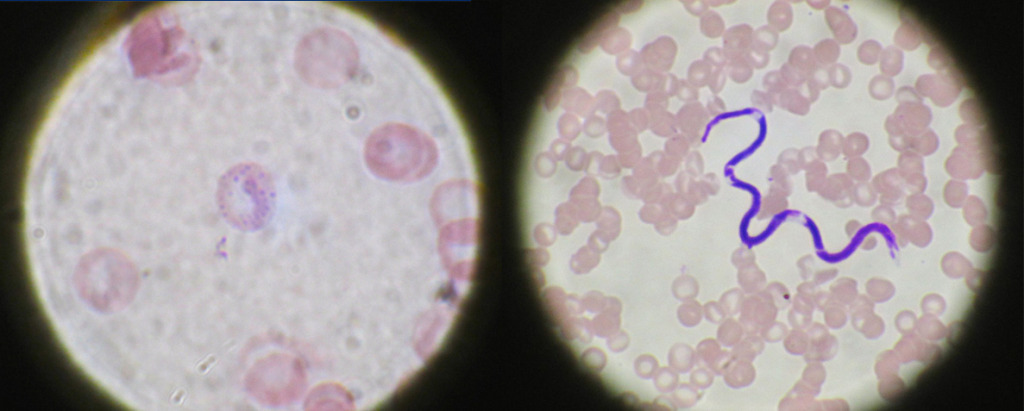PhD Candidate Alisa Kubala Conducts Research on Malaria in Eastern Gorillas
By Gorilla Doctors Staff on Thursday, October 23rd, 2014 in Blog.Every year, Gorilla Doctors supports graduate and PhD student research projects examining infectious diseases in eastern gorillas. This year, Gorilla Doctors has facilitated PhD research projects on respiratory illness in mountain gorillas in Volcanoes National Park and herpesviruses in mountain gorillas in Bwindi Impenetrable and Volcanoes National Parks. Also this year, Gorilla Doctors hosted Murdoch University PhD candidate Dr. Alisa Kubala, who is conducting research on malaria in eastern gorillas in Rwanda and DRC. Dr. Kubala generously agreed to share insights and details about her research and experience working with the Gorilla Doctors in the field.
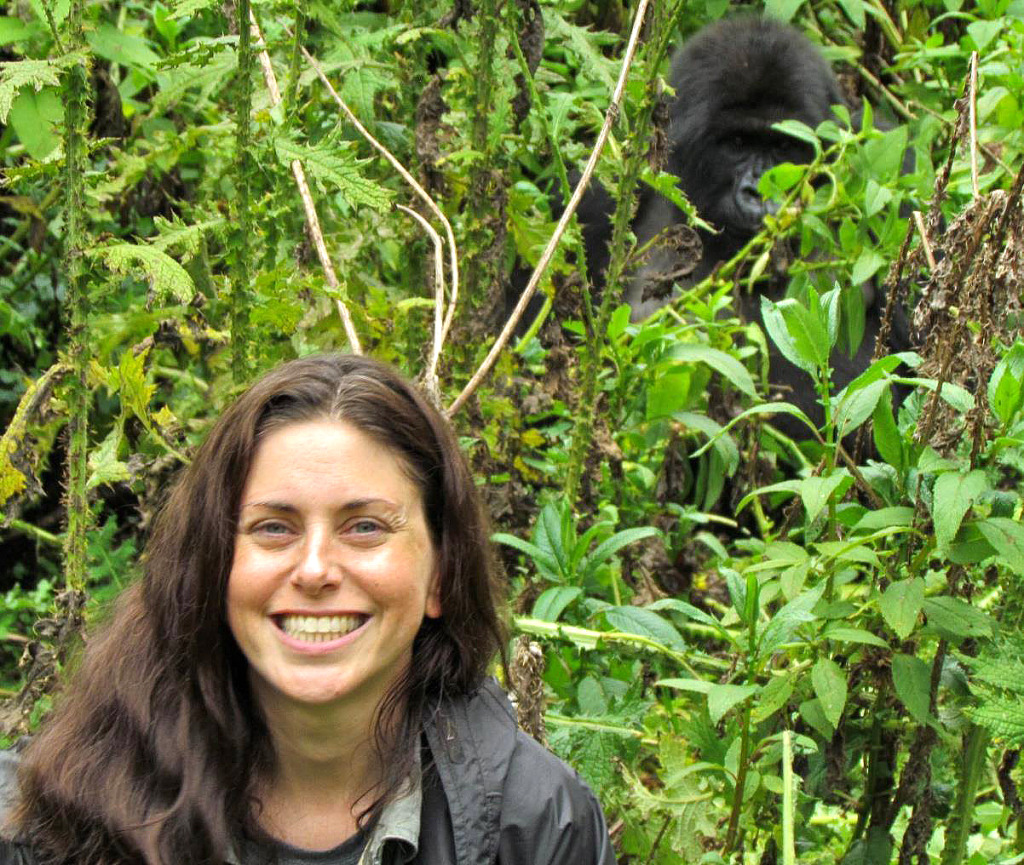
Dr. Alisa Kubala in the field with a mountain gorilla.
Dr. Kubala’s PhD thesis, Health and Conservation of Eastern Gorillas: A One-Health Study of Blood-Borne Parasites and Retroviral Infections is looking specifically at the prevalence of malaria, microfilaria and retroviruses in eastern gorillas, humans, and other primates in Virunga and Kahuzi Biega National Parks in DRC.
These three diseases are endemic in humans in eastern gorilla host countries, where they are leading causes of morbidity and mortality. Some evidence suggests that co-infection with all of these pathogens can lead to increased parasite/viral loads, faster disease progression, and increased disease transmission.
Dr. Kubala’s research will give insight into whether eastern gorillas are infected with any of these pathogens, if they can acquire these pathogens from humans, and if these pathogens cause any clinical disease. Her work will also hopefully reveal which vector species (mosquitoes and flies) are responsible for transmission of malaria and microfilaria in and around eastern gorilla habitats.
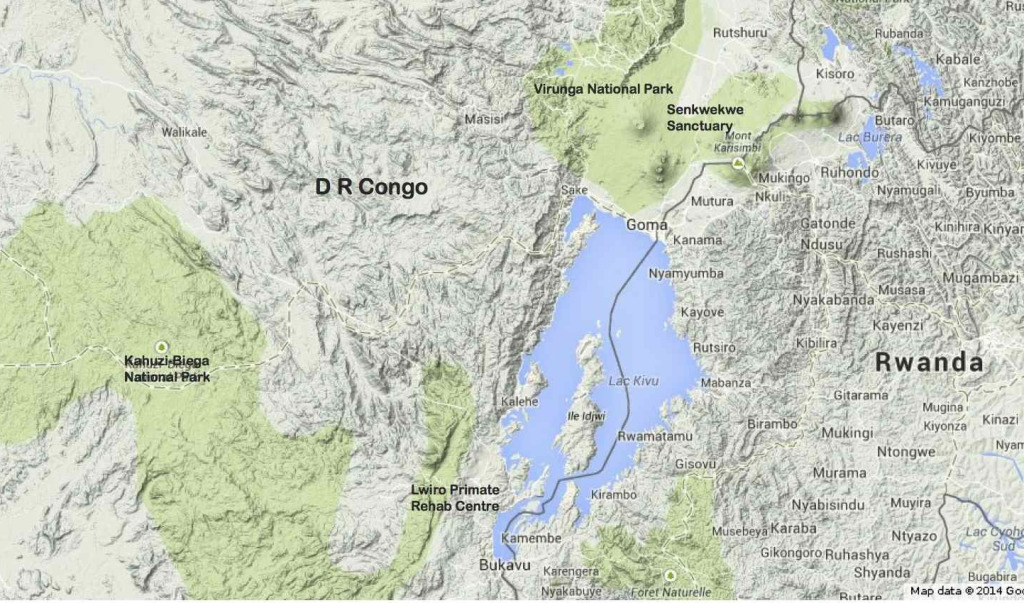
The region of central Africa where Dr. Kubala is conducting her research.
The study is complex in that it requires the collection of blood and fecal samples from humans, gorillas, chimpanzees, baboons and monkeys sharing habitat in Kahuzi-Biega and Virunga National Parks. Of course, it also requires the collection of the vectors that transmit malaria and microfilaria in these habitats.
“Some of my sample analysis occurs in the field, but the vast majority occurs in specialized laboratories in the United States. Obtaining so many samples from two national parks, storing and transporting them to international laboratories requires careful collaboration among the entire Gorilla Doctors team.”
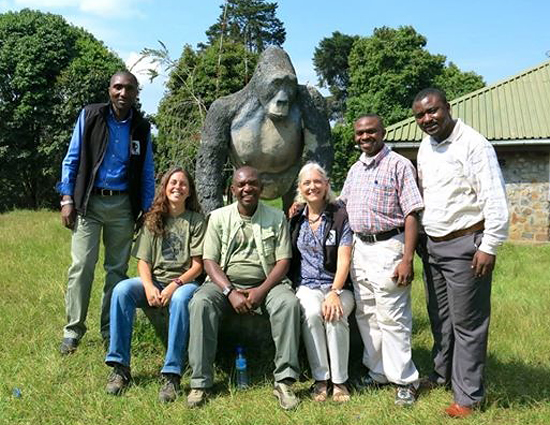
Dr. Kubala with staff members from the Gorilla Doctors and Radar Nishuli, Director of Kahuzi-Biega National Park.
Gorilla Doctors Employee Health Manager, Jean Paul Lukusa, has helped facilitate the collection of human samples for Dr. Kubala’s research and these samples come under strict confidentiality from the employees of both national parks and their families when they participate in the Employee Health Program. While conducting annual health exams and obtaining blood and fecal samples, Jean Paul also delivers a questionnaire to each employee to help Dr. Kubala determine risk factors for malaria, microfilaria and retroviral infection among humans in the two parks.
Blood and fecal samples from gorillas and other primates are not so easily to obtained, however. Only when an individual is anesthetized for a medical intervention in the field (or during routine health checks of the orphans at the sanctuaries) can samples be opportunistically collected, though fecal samples can sometimes be collected from the wild gorillas’ night nests. “Fortunately, I’ve been able to accompany Gorilla Doctors DRC Field Vets Dr. Eddy Kambale and Dr. Martin Kubayaya, as well as Regional Manager Dr. Jan Ramer, on several field interventions and routine health checks of the Senkwekwe Center gorilla orphans and collected important samples for my study.”
Chimpanzee, baboon and monkey interventions and health checks are carried out at Lwiro Primate Rehabilitation Centre (CRPL) by the Centre’s Veterinary and Technical Director, Carmen Vidal. Time and circumstances permitting, Dr. Kubala will go along to help with sample collection and organization.
After blood samples have been collected, many hours are spent at a field microscope, reviewing each sample for malaria and microfilaria:
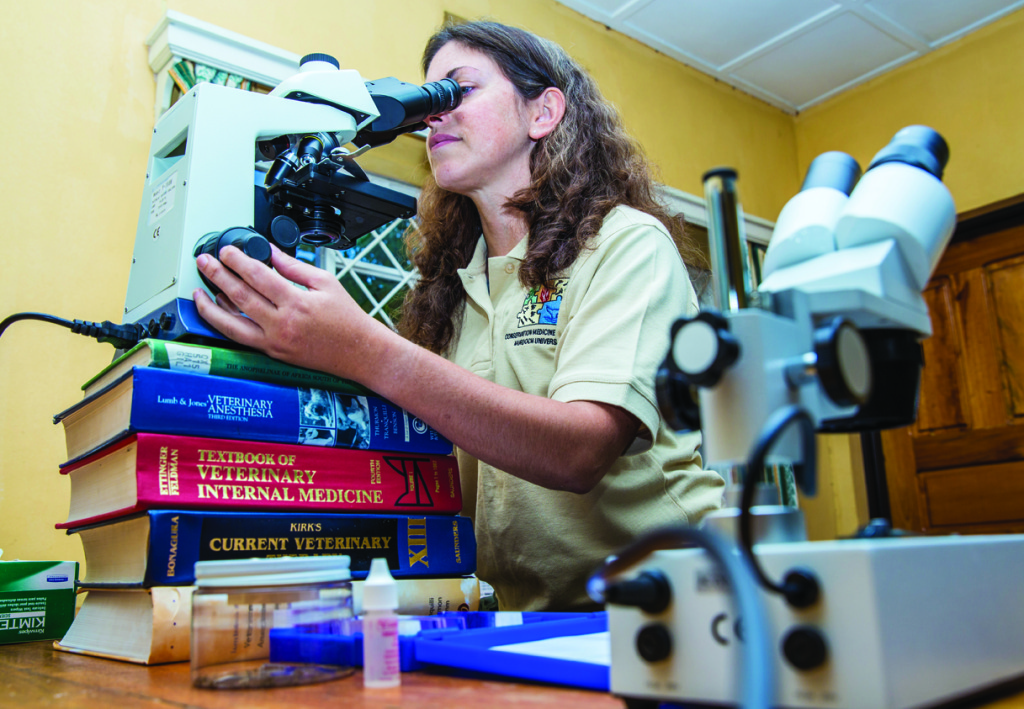
Dr. Alisa Kubala working in the lab at the Gorilla Doctors Regional Headquarters in Musanze, Rwanda. Photo by Life Through a Lens Photography.
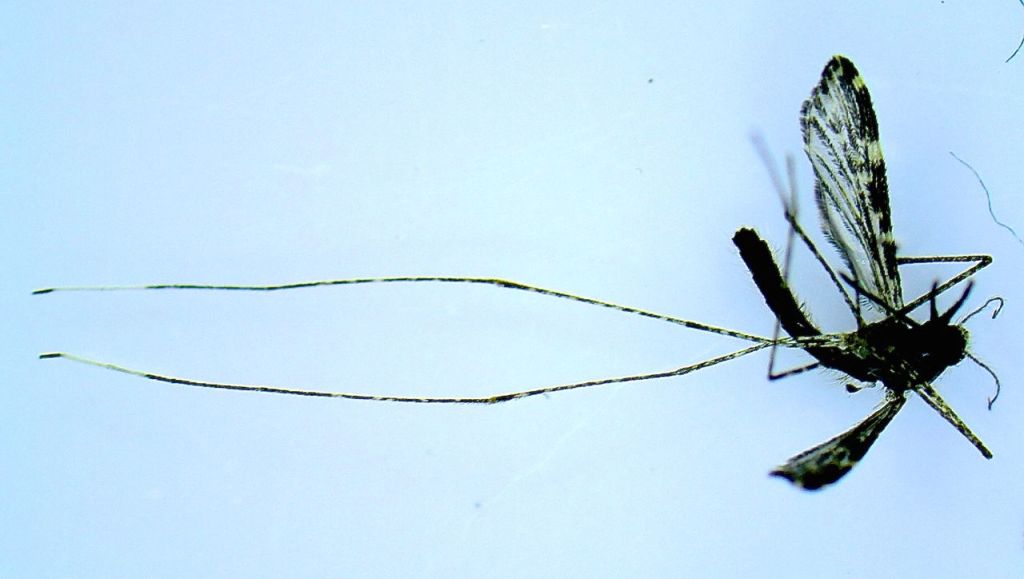
Mosquito (Anopheles kingi) captured at a gorilla night nest in Kahuzi-Biega National Park.
Vector traps, an important component of the sample collection, requires the collaboration of national park workers and Gorilla Doctors veterinarians. Currently based at Kahuzi-Biega National Park and Lwiro Primate Rehabilitation Centre, Dr. Kubala captures mosquito and fly vectors daily by hiking up to gorilla night nests or to chimpanzee, baboon or monkey enclosures and setting up light traps. Vector trapping in Virunga National Park is being completed by trackers, guards and administrators of the national parks, who take traps home with them every afternoon in order to capture vectors at many different locations around the parks overnight.
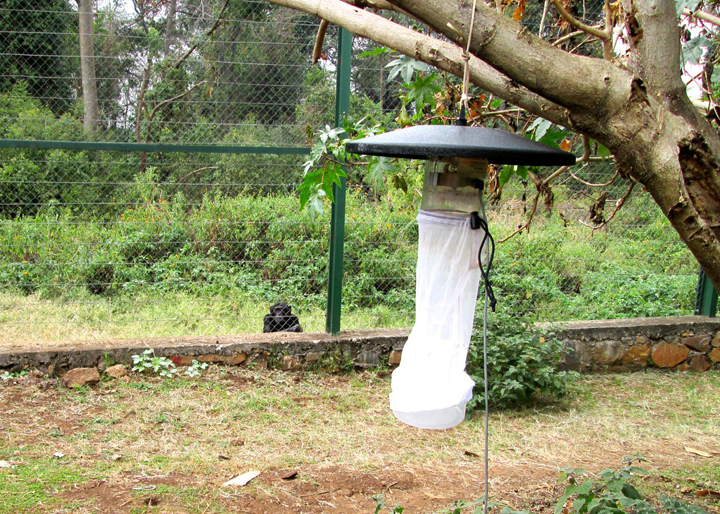
A vector trap near the chimpanzee enclosure at Lwiro Primate Rehabilitation Centre.
“When traps are taken down the next day, I spend several hours at a dissecting microscope in the field identifying each vector to species level” said Dr. Kubala. “While I am able to do the gross analysis of blood smears and vectors in the field, I do the molecular analysis of blood, feces and vectors at two specialized laboratories in the United States.” Gorilla Doctors Laboratory Technician Dr. Methode Bahizi runs the hematologic analyses of gorilla blood samples in order to determine reference intervals for the species, while Bio Bank Manager, Jennifer Sohl, RVT, runs all of the biochemical analyses at the Gorilla Doctors Biobank at the Maryland Zoo in Baltimore.
“A study of this size is certainly a team effort. Its successful completion will be a testament to the determination of Gorilla Doctors to support ambitious health research in order to provide the best possible medical care to the world’s remaining eastern gorillas. I’d like to thank the Institut Congolaise pour la Conservation de la Nature (ICCN) for their gracious permission to conduct this study in their national parks.”
Dr. Kubala will remain in Kahuzi-Biega National Park to collect samples throughout the rainy season until February 2015. She will return for dry season sampling from May to August 2015, and analyze her samples in the United States from November 2015 to February 2016.
![]()


 Donate
Donate
